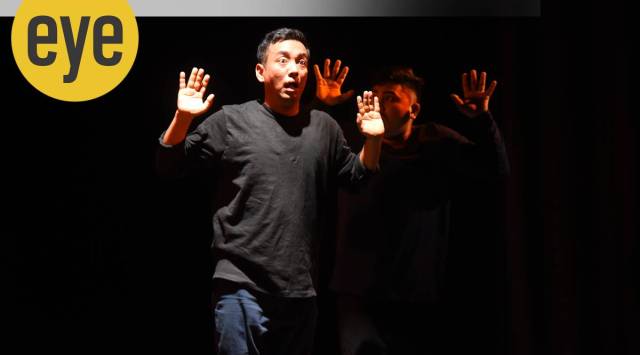📣 For more lifestyle news, click here to join our WhatsApp Channel and also follow us on Instagram
META winner Victor Thoudam on interpreting global problems on stage through his experiences of being a Manipuri
His non-verbal play, The Departed Dawn, won in three categories, including Best Choreography and Best Actor in Lead Role (Male)
 Victor Thoudam in The Departed Dawn (Pic source: META)
Victor Thoudam in The Departed Dawn (Pic source: META)When theatre performer Victor Thoudam travels out of Imphal, Manipur, he wants to comes back. He wants to see the big banyan trees and the polluted brown waters of the once-crystal clear Imphal River that runs in front of his house. After completing his studies at the London International School of Performing Arts (LISPA) in 2017, Thoudam had a chance to stay back in the UK and start a company but home called out to him. It was here, at the place where he grew up, that Thoudam and Kathmandu-based playwright and director Bimal Subedi decided to create a play about people who are forced to leave their homes.
The production, The Departed Dawn, responds to the global refugee crisis and the plight of the displaced. It is drawn from the forgotten tragedy of the Lhotsampas, in which one lakh Nepali-speaking Bhutanese were driven out of Bhutan in the 1990s. Subedi has worked and written extensively about them. The play is non-verbal and does not name any ethnic group; instead the protagonists belong to the global milieu of the homeless. Last month, it was selected as one of the top 10 post-pandemic plays from almost 400 applications at the Mahindra Excellence in Theatre Awards (META) in Delhi. It won in three categories, including Best Choreography and Best Actor in Lead Role (Male) for Thoudam.
In a poignant moment on stage, the lead character, played by Thoudam, is thoughtfully studying one shoe. He turns it over, strokes the sole and then slowly sniffs his fingers. The smell of the soil transports the refugee to the farm where he once lived and grew crops. “The Lhotsampas, who made the journey to other places, still believe that one day they will return to their country. Some of them have small boxes with mitti. Their grandchildren have adjusted to new countries but the older generation, whether they are in Nepal, Norway or the US, say that the taste of apples in Bhutan cannot be compared to that from anywhere else,” says Thoudam.
The draconian Armed Forces Special Powers Act had seeped into every facet of life in Manipur decades before Thoudam was born in the 1990s. The Army would patrol his neighbourhood at no fixed time. At night, they would bring torches and slide the light over the sleeping houses. Then there were insurgents who would come knocking, wanting shelter for a night and staying on a week while the family lived in fear. “Something has been ingrained in my psyche about militarisation. It is to get this ‘something’ out that I make theatre every day,” says Thoudam.
Some of the greatest contemporary artists of Manipur have confronted the presence of the military with works that are stark as well as rich in metaphor and symbols. Ratan Thiyam, who speaks six languages and understands eight, makes plays only in Manipuri, without subtitles. His Karnabharam (1976) and Urubhangam (1981), are based on texts by Bhasa, one of the earliest Sanskrit playwrights and an anti-establishment figure. Heisnam Kanhailal and Heisnam Sabitri, with whom Thoudam has trained, have created classics such as Draupadi (2000), based on a Mahasweta Devi story of Dopdi Mejhen, a Naxalite rebel of the 1970s, who is picked up by soldiers and repeatedly gangraped. Thoudam responded to his surroundings by going deeper into Manipuri culture and learning mime and martial art forms of the region from a young age. He found pride in local fables, in news reports of protesting women and in the state’s achievements in sports, arts and other fields.
Thoudam’s parents focussed on academics and reading. His family did not believe in guns. They sent him away to a boarding school, Sainik School Imphal, Pangei, where Thoudam decided that he did not like hierarchy. By the time he enrolled at Ramjas College in Delhi for graduation in Physics, Thoudam had started to question himself about his identity and what he really wanted to do. While he had performed in school shows, it was at Shunya, the dramatics society of Ramjas College, that Thoudam properly turned to theatre.“I tried to form a different team from the main Shunya. I believe in physical theatre, perhaps because I could barely speak Hindi, the language of the city,” says Thoudam. A mime performance by him, The Sangai, about a deer found only in Manipur, went to a festival at BITS Pilani and won the first prize.
 Victor Thoudam in The Departed Dawn (Pic source: META)
Victor Thoudam in The Departed Dawn (Pic source: META)
In 2007, after completing his BSc, Thoudam worked in an NGO before enrolling at the National School of Drama (NSD) in 2009. NSD was one of India’s best arts institutions at the time. At Shunya, he had begun to explore the performative powers of his body but at NSD, he simply sat back and enjoyed lectures on world theatre and Indian theatre, among others.
Thoudam returned to physical theatre after NSD, when he enrolled at Kalakshetra Manipur, the centre run by Kanhailal in the guru-shishya tradition. Kanhailal’s form has many names, from ritual theatre to Theatre of the Earth. He understood the Manipuri body and his practice was embedded in tradition but not translated literally. Thang-Ta became something else on Kanhailal’s stage. The physicality that sets Thoudam apart today was honed by Kanhailal and developed further when he went to LISPA, which worked out of London and Berlin. “This was the time of the Syrian crisis and we made a promenade piece, titled The Fantastical, in Berlin in the building that had been given to refugees,” says Thoudam.
His theatre is, both, a protest and a quest for peace and inclusion. When he set up a theatre group in Imphal in 2017, Thoudam gave it a Naga name, Akhoka, rather than a Manipuri one. Akhoka means foundation. “There are three major communities in Manipur — the Meitei, the Naga and the Kuki— and we have been living in a state of tension. I want to see a place where there is no such thing as communal disharmony. If there is a building, Akhoka is its strongest pillar,” he says.
His theatre addresses global concerns but Thoudam’s prism is the Manipuri reality. It’s a Myth (2017), which uses rhythm, body movements and sounds created by the performers, revolves around discord and hope. Black and White (2018) was about outside powers injecting conflict into syncretic societies. Coming up is a play on the environment, focussing on dams.
The Departed Dawn is Thoudam’s biggest work. After winning the two META for the play, he returned to Imphal and made the trek through hilly paths to Kalakshetra Manipur to meet Sabitri. “I felt very shy in front of this great actor. I just bowed. She had already heard about the awards. She told me, ‘I have heard good things about you,’” he says.
📣 For more lifestyle news, click here to join our WhatsApp Channel and also follow us on Instagram



- 01
- 02
- 03
- 04
- 05

























